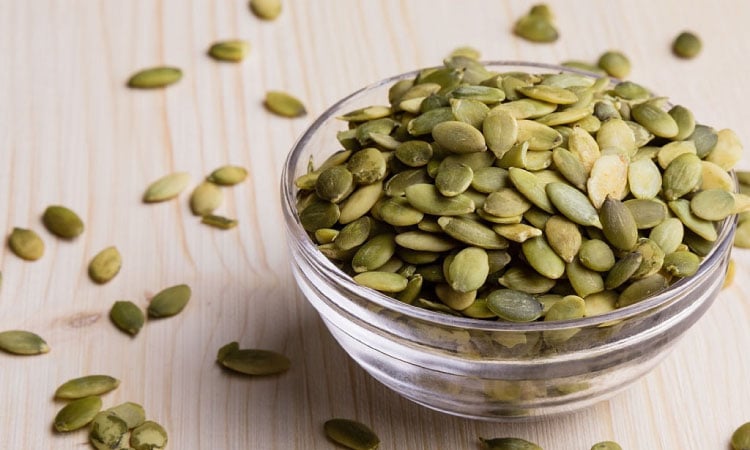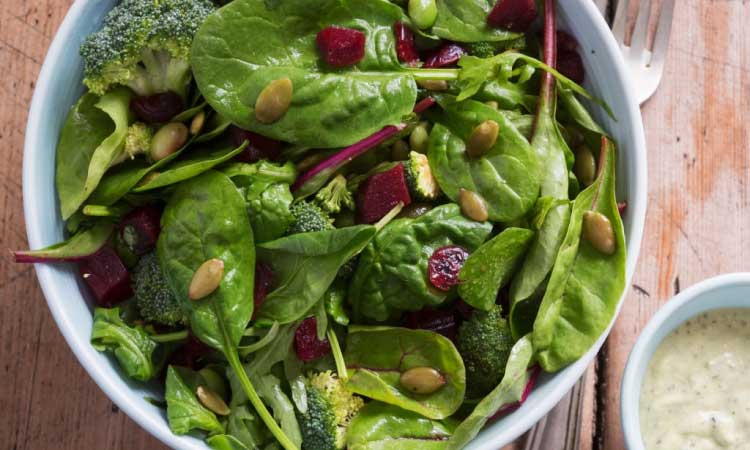Do you enjoy eating pumpkin seeds but are unsure whether it is safe to consume pumpkin seeds during pregnancy? Well, you are on the right page.
Pregnancy is a challenging period, during which eating healthy is essential. When you are pregnant, your body needs extra nutrients to allow your baby to grow normally. If you’re a healthy eater, you won’t have to make big changes to your daily diet.
Besides, prenatal vitamins provide all the essential vitamins and minerals for the healthy progression of pregnancy. However, that won’t stop the expecting woman from questioning the safety of the food she eats. Here we are going to evaluate the safety of eating pumpkin seeds during pregnancy.

Nutritional Value Of Pumpkin Seeds
According to a source, pumpkin seeds contained 41.59% oil, 25.4% protein, 5.2 % moisturizer, 25.2% carbohydrate, 5.34 % fiber, and 2.49% total ash.
- Raw pumpkin seeds are a good source of magnesium, manganese, iron, phosphorous, and copper
- Pumpkin seeds are laden with nutrients, calories, fats, proteins, and fiber
- Mostly the fats in pumpkin seeds are polyunsaturated and monounsaturated fats. These forms of fats are healthy fats
- It has a considerable amount of B vitamins
- Also, vitamin C, vitamin E, and vitamin K are present in pumpkin seeds in different quantities
- Pumpkin seeds also contain minerals like calcium, potassium, sodium, zinc, etc
Since pumpkin seeds are such power packed in nutrition, they are also in our list of 21 pregnancy superfoods to include in your pregnancy diet
Is It Safe To Eat Pumpkin Seeds During Pregnancy?
Pumpkin seeds are a little more than safe to eat during pregnancy. These flat, oval-shaped seeds, which are also known by the name “pepitas”, carry vitamins and minerals that are highly beneficial for the healthy progression of pregnancy.
Pumpkin seeds are one of the superfoods, as far as pregnancy is considered. By consuming pumpkin seeds without crossing the moderation, you can reap all its benefits.
Benefits Of Pumpkin Seeds During Pregnancy

Here are 13 mind-blowing benefits of eating pumpkin seeds during pregnancy:
Calculate Due Date With LMP
1. Pumpkin seeds help to enhance immunity
Are you looking to boost your immunity during pregnancy? During pregnancy, the mother’s immune system is compromised, but pumpkin seeds can help to enhance immunity as:
- Pumpkin seeds are high in cell-protective antioxidants such as carotenoids and vitamin E, which help to boost immunity
- Pumpkin seeds contain zinc and iron, which are essential for the immune system
- Pumpkin seeds are antifungal and antiviral in nature
- Sterols in pumpkin seeds can effectively prevent hormone-based cancers
2. Carries the goodness of zinc
A minimum of 13 milligrams of zinc is recommended on a daily basis for pregnant women. According to a source, 1 cup (or 129 g) of pumpkin seeds provide 10.07 mg of Zinc.
Being rich in Zinc, pumpkin seeds help to
- Fight common infections like cold
- Control mood swings
- Produce DNA, which supports rapid fetal cell growth.
- Prevent complications like miscarriage and low birth weight of the baby
Related Reading: 11 Indian Home Remedies For Cold During Pregnancy
3. Helps to combat iron deficiency anaemia
During pregnancy, the blood volume increases up to 50%. More red blood cells are required for the development of new life inside the womb; hence the requirement of iron also escalates. Pumpkin is a must have vegetable in your list of foods to increase fetal weight during pregnancy.
Iron deficiency is a common issue during pregnancy. Adding pumpkin seeds to your diet is one of the natural ways to boost the iron intake. According to a source, 100 grams of pumpkin seeds contain around 8.8 milligrams of iron.
4. Reduces the risk of gestational diabetes
Pumpkin seeds contain fibers, magnesium, antioxidants, and carotenoids, which help to control the factors that increase the risk of gestational diabetes. Pumpkin seeds may be able to keep insulin levels under control and thus aid in dealing with gestational diabetes.
If you already have gestational diabetes, consuming pumpkin seeds may help you keep it under control. If you are at risk of developing gestational diabetes, pumpkin seeds can help significantly reduce your risk by regulating insulin levels.
5. May help to regulate blood pressure
The high magnesium content of pumpkin seeds helps reduce and regulate blood pressure. The ability of pumpkin seeds to increase the production of nitric oxide is another thing that helps regulate blood pressure.
Nitric oxide helps dilate blood vessels, thereby improving blood flow and reducing the risk of arterial plaque build-up. Nitric oxide is an unstable molecule that is rapidly destroyed by free radicals in the blood.
Antioxidants neutralize free radicals and increase the production of nitric oxide in the body. Pumpkin seeds are rich in antioxidants.
6. Helps to combat fatigue

Women often feel worn out as their pregnancies progress. Consuming foods high in Vitamin B, which produces energy, is one solution to combat the signs of weakness during pregnancy. Vitamin B is abundant in pumpkin seeds. Consuming pumpkin seeds during pregnancy third trimester will be extremely beneficial in this perspective.
7. Improves the quality of sleep
Many mothers have difficulty sleeping once they reach the second trimester of their pregnancy. There are multiple causes of sleep deprivation during pregnancy and by consuming pumpkin seeds a few hours before bedtime helps improve sleep quality. Let us find out how pumpkin seeds can help mothers-to-be sleep better.
Pumpkins are high in the amino acid tryptophan. According to research, tryptophan promotes sleep. This amino acid is the precursor of serotonin and melatonin. Melatonin induces sleep.
According to research, magnesium is also essential for normal sleep regulation. Pumpkin seeds are high in magnesium, which aids in the improvement of sleep quality. So eating pumpkin seeds during pregnancy second trimester helps soon-to-be- mothers sleep better.
Related Reading: Excessive Sleeping During Pregnancy – Causes, And Remedies
8. Support fetal brain development
Pumpkin seeds are high in omega 3 fatty acids and healthy unsaturated fats. Omega-3 fatty acids support the development and growth of the fetal brain and central nervous system.
9. Prevents neural tube defects
Folate, a B vitamin,plays a very important role in fetal brain development. To avoid neural tube defects such as spina bifida, optimal folate intake is required.
Pumpkin seeds contain a significant amount of folate. Even though prenatal supplements provide a major portion of the daily required folate, adding pumpkin seeds to the pregnancy diet gives a push to folate intake.
10. Helps to deal with mood swings
Pumpkin seeds are thought to have antidepressant properties, so eating them can help with the mood swings that are common during pregnancy. According to research, magnesium has the potential to reduce stress and anxiety.
Pumpkin seeds are high in magnesium. As a result, eating pumpkin seeds during pregnancy may help to reduce the mother’s stress level. Along with eating healthy, there a few tried & tested ways to handle emotion during pregnancy.
11. Helps to combat constipation
Unshelled pumpkin seeds are high in fiber. Pumpkin seeds, which are high in fiber, keep your bowels active during pregnancy. As a result, eating pumpkin seeds helps to prevent constipation during pregnancy, which is a common complaint among pregnant women.
12. Enhance bone health
Pumpkin seeds are rich in Magnesium. Magnesium is important for bone strength. It helps to enhance bone density. Maintaining bone health during pregnancy is very important. If not, the chances of mothers contracting osteoporosis in the future are very high.
13. Aids in the elimination of intestinal worms
It is one of the foods that naturally kills intestinal worms. Curcurbitin, a compound with anti-parasitic properties, is found in pumpkin seeds. This substance has the potential to paralyze worms in the intestine and digestive tract, and eliminate it.
What Happens If You Eat Too Much Pumpkin Seeds?
- Excessive consumption of pumpkin seeds can result in stomach aches, flatulence, bloating, and constipation
- Eating too many pumpkin seeds can cause bloating
- The fiber in pumpkin seeds normally helps to prevent constipation. But eating too many pumpkin seeds at one stretch, on the other hand, may cause constipation
- Since pumpkin seeds are loaded with calories, eating them in excess can lead to weight gain and we very well know that being overweight during pregnancy can cause potential complications
- Pumpkin seeds are known to lower blood sugar levels. Overconsumption of pumpkin seeds can result in hypoglycemia a condition in which the sugar level drops dangerously low
Side Effects Of Pumpkin Seeds During Pregnancy
Two important side effects of pumpkin seeds during pregnancy are:
- The phytic acid in pumpkin seeds can inhibit the bioavailability of certain nutrients in food
- In rare cases, pumpkin seeds can cause allergic reactions in pregnant women. People who are allergic to pumpkin seeds may experience headaches, itching, rashes, and shortness of breath
Incorporating Pumpkin Seeds To Pregnancy Diet

- Unshelled pumpkin seeds can be added to salads
- Sprinkle chopped and roasted pumpkin seeds on the salad to enhance the nutritional value
- Pumpkin seeds can be added while preparing soup
- Sprinkle chopped pumpkin seeds on yogurt
- Blend it in while making smoothies
- You can give a tasty twist to desserts by adding roasted pumpkin seeds
- Pumpkin seed snacks can be made by roasting them and adding onions, tomatoes, salt, and pepper to them
Conclusion
Pumpkin seeds are safe and beneficial during pregnancy. The best part is that pumpkin seeds can easily incorporate into the pregnancy diet.
Related Reading: Top 10 Protein-Rich Foods For Pregnancy
FAQs
There is no set time when you should eat pumpkin seeds. Unsalted pumpkin seeds are a great snack that you can eat anytime, anywhere. However, eating pumpkin seeds before bedtime can help you sleep better.
The pumpkin seeds are highly nutritious. Consuming 30g of pumpkin seeds daily will take your daily nutrition to a whole new level.
Pumpkin is high in calories and loaded with healthy fats. So, yes, excessive consumption of pumpkin seeds can increase weight.
There are chances of pumpkin seeds carrying contain E. Coli. More often contamination of pumpkin seeds happens if they were handled in an unhygienic way.
Even though rare, pumpkin food poisoning can happen. And if it happens during pregnancy, serious consequences may happen.
